#he's Kind Of A Genius and very very very very whipped for his predecessors
Note
hc + culture for zant !!
It’s incredibly important to him, and one of few things that wholly capture his interest and attention. It’s born of surprisingly sincere…not affection, perhaps, it’s not personal enough with others to feel a just candidate for the term, but admiration. He’s not purely being Chaotic Evil Stupid Vengeance King, after all – it’s overkill in its extreme, but he feels he’s avenging a grievous injustice done to his ancestors, who he holds in impossibly high esteem.
The vast majority of Interloper culture is gone, either through simple lack of recordkeeping and the unavoidable casualties of being literally ejected from the world / dimension you occupied, and through very normal evolution into Twili culture; Zant takes the distinction seriously, and regards the latter as all-around inferior and almost insulting on all levels. There’s actually something to be said for it, at least in that it’s resulted in a people altogether pitifully weak compared to what they might have been otherwise. ( Which DOES matter even to the Twili, if the whole ‘elective monarchy based heavily on power’ is anything to by, and that Zant’s temperament would have been tolerated for so long and humored so seriously simply because he was - relative to them all - a hell of a lot stronger magically. ) And that Zant is himself so strong can be largely credited to the fact he’s spent his entire life bottle-fed everything his grandfather - his only caretaker - could recall, and voraciously hunting down and reconstructing as much as he possibly could. He values it because he feels it’s honoring a whole crop of people who were given one of the most raw deals in all of that universe’s lore, and because it very tangibly made him strong and useful for his efforts.
I don’t imagine he had any specific ties to the royal family, and rising up through ranks in that system isn’t exactly…..a thing, so it elevated him to a position of power and influence he never could have hoped to attain otherwise, in addition to the more obvious in-your-face magical benefits. Socially, it………mostly made him weird? He was exceedingly particular about seemingly arbitrary things and tended most of his needs himself ( self-healing, either made his own clothes or was breathing so far down the tailor’s neck he might as well have, wrote and fucking bound his OWN BOOKS comprised of what he knew, invented spells, reconstructed spells, grew his own specific food in specific ways – imagine if you lived in a perfectly ordinary neighborhood and your neighbor was for some reason just determined to live as if they were Amish, and you get my point. Contributed a lot to his having something of a reputation as a hermit before the Court brought him into much more consistent and close interaction with others.
He’s got a fairly brilliant mind, really, and it’s a shame he went so far and fast down the road he did.
( And it’s heavily my own stuff, but I imagine it left him in some state of shock after leaving the twilight realm. As I headcanon it, the interlopers were a sort of Sheikah offshoot that focused much more on progressively darker magic and much less on ninja-ing, and so being exposed to any Sheikah-related-anythings sends HARD ALARM BELLS going off in his brain and he takes some time to immerse himself. The Sheikah have obviously evolved and grown and changed just as greatly, but they’re similar enough to garner his attention, and peeling back as much of their history as he can would be……….like fifty christmasses. Please. He needs it. )
A hot take: if you showed Zant a divine beast, sheikah slate, or shrine? He’d actually recognize it, and if given sufficient time and a safe environment for tinkering, potentially reverse-engineer-teach himself more than enough to use them at full potential.
#triiforced#NOR THE FAINTEST BLOOM OF DESIRE ( zant : headcanon )#additional hot take: a human / modern Zant would be like........your weird pseudo-Amish neighbor who wears uncomfortable turtlenecks and is#writing a book in his free time comparing how various cultures preserved spices or some shit like that#he's Kind Of A Genius and very very very very whipped for his predecessors#does any of this make sense I'm a ramblin' mess oh my GOD I love Zant#edit: MY BIGGEST HOTTEST TAKE tied in with the whole 'they're Edgier Magicier Sheikah' angle?#he'd be able to DISSECT Termina#and he's also something of a last active Majora worshipper?#things that are scarier than Zant at full Ganonpower? Zant with Majora's Mask
1 note
·
View note
Text
The Kaiser wasn’t very good at being a villain (and that’s the point, actually)
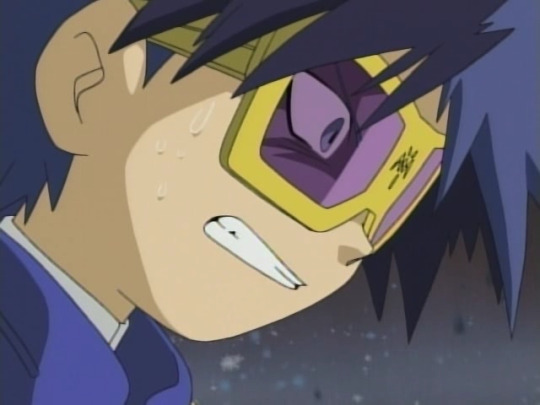
Ken’s journey of redemption is generally well-documented overall, and it was explicit enough in the series that there’s only so much you really need to explain it, but due to the blurred boundary of what was supernatural influence from the Dark Seed and what was Ken’s own emotional problems wreaking havoc, it’s somewhat more difficult to bridge that gap between the Kaiser and Ken, and how they can be the same person.
The easiest way to understand it comes from both directions. One is that Ken, even in his normal element, is much more assertive than he’s often given credit for -- it’s just that the Kaiser is a (fragile) manifestation of that very carefully cultivated to channel that in all of the wrong directions. The other has to do with the fact that the Kaiser is actually really terrible at being a villain, and the persona itself is very fragile and difficult for him to maintain.
Rewatching the first half of 02 shows multiple indications that, for all he seemed to be the stereotype “evil genius”, Ken was forcing himself into the mold. He was never cut out for it from day one. Even from the beginning, Ken’s actual nature as a lonely and inherently kind eleven-year-old child was tearing apart at the Kaiser persona, and the fateful episode 21 was not so much a single turning point for him as much as it was the last straw in a series of things tumbling down for him.
Before we continue: While all of the meta on this blog is only possible thanks to support and input from a handful of friends (whose names will not be disclosed on account of privacy requests), this one in particular arose from a long and extensive discussion with said friends that I am extremely grateful for. As always, I hope I was able to convey your points well.
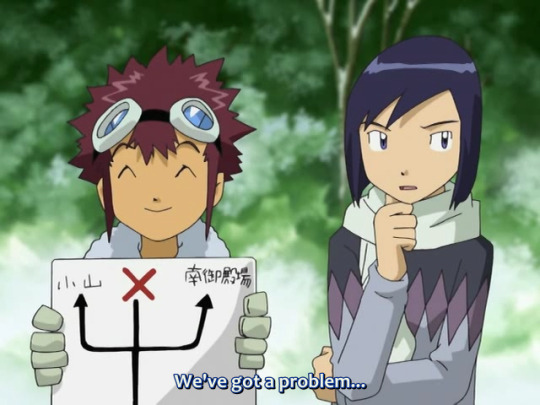
Well, firstly, it’s important to understand that, much like nearly any other character in this series, Ken’s surface demeanor is a bit deceptive. The Crest of Kindness has the original Japanese name of yasashisa (優しさ), which has a secondary meaning of “gentleness” (lost in translation, but still apparent with the bubble metaphor in 02 episode 23). That also ties into the secondary meaning of “kind” -- it’s not just about being naturally “soft”, but actively choosing to be gentle with others even when you’re theoretically capable of not doing so. (For those of you who have seen Appmon, the entire point of that series was about what it means to consciously and deliberately choose to be kind, and, in fact, quite a few parallels could be made between Ken and Haru...)
The contrast between Daisuke and Ken goes far beyond just the surface. Daisuke’s surface demeanor is abrasive, but he’s not actually very good at being assertive until push comes to shove, and he otherwise tends to bend easily to others or get overwhelmed; in contrast, Ken has a more polite demeanor and for the most part seems non-confrontational, but has much stronger control of his emotions and is more easily able to be assertive than Daisuke is. (Of course, both of them share the common point of being like-minded when it’s something that really matters, but Ken is much better at imposing his will and getting what he wants done before Daisuke ever gets to that point, which is what fuels the whole punchline of Daisuke and Ken’s Shopping Carol.)
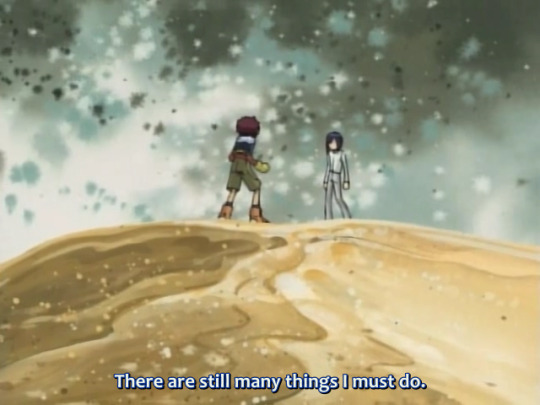
So, the point is: Daisuke is kind out of instinct and just “naturally” being so, but Ken is kind because he consciously believes in treating others well and not causing conflict, and not causing pain to others.
That’s not to say that Ken’s behavior is out of suppression or anything! It’s not a case like Takeru, who’s trying to push complicated emotions down while pretending they’re not boiling under the surface, nor is he like Hikari, who’s compulsively pressing her emotions down out of a desire not to burden others. Rather, even as early as 02 episode 26, he’s very straightforward about what his issue is and what he thinks about it. Ken’s “shyness” during the latter half of 02 is largely due to shame and hesitation from not knowing the other 02 kids well, but as the series goes on and as we go into post-02 material, he indicates that he’s perfectly wiling to be vocal about what he thinks without necessarily fighting any compulsion to suppress it. For someone who claims he doesn’t know much about his own heart, he arguably seems to have the best grip on understanding himself compared to a lot of this cast!
So in essence, the main take-home here is that Ken is theoretically capable of being strong-willed and assertive, and is very good at choosing when he wants to be assertive and when he wants to hold back. And he likes seeing people get along, and he wants everyone to be happy, and he doesn’t like seeing people be hurt or hurting others, and under normal circumstances, Ken has very good control of his emotions for the most part and quite a lot of self-awareness. That’s why Ken is the one to get the unique designation of this Crest; everyone in this cast can be said to be generous and supportive of others in some form, but there’s a difference between being a “natural” doormat who defers to others by default (Daisuke being a very good indicator of how this kind of mentality has a flip side of lack of self-esteem and high insecurity, and Tamers’s Takato being a good indication of how “being deferential” doesn’t necessarily preclude you from having tendencies towards selfishness or cowardice), versus choosing to be kind by understanding everything and still being gentle out of a belief that it’s the right thing to do (again: see Shinkai Haru). And it’s why Wormmon says in the 02 episode 23 flashback that Ken’s kindness can be used against him; being “kind” in this way requires a lot of mental fortitude, strength, and guts, all of which are things that could easily be very bad things when applied in the wrong direction.
This means that all the Dark Seed really needed to do in order to turn him into the Kaiser...was make him lose grip on that self-control.
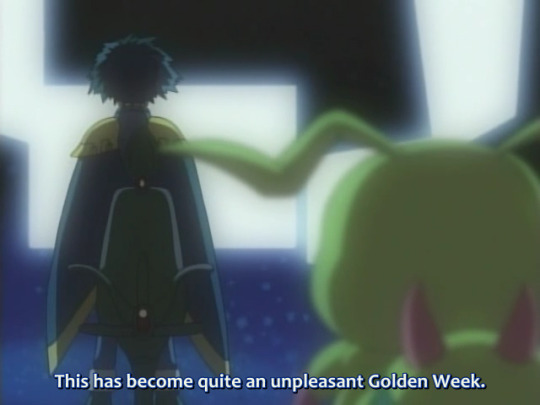
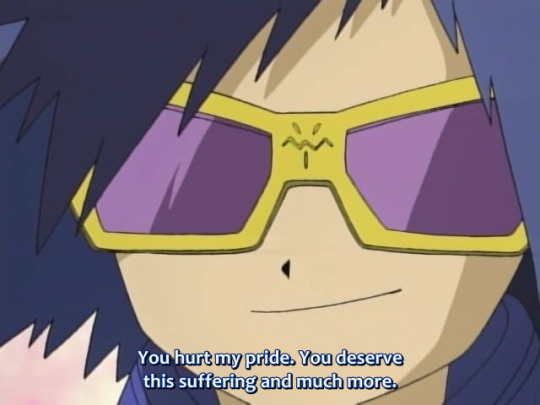
Actually, Ken says it himself in less-than-subtle words in Spring 2003:
…It was revenge. But who was this revenge against? Did I want to triumph over the ones who made fun of me? The ones who looked down on me and used me?
But… In the end, it was revenge against myself. I couldn’t do anything but deny the kind of human being that I was.
So in other words, the Kaiser persona was, effectively, a self-loathing eleven-year-old boy throwing a massive tantrum. A lot of the Kaiser’s actions in the first half of 02 are honestly rather petty -- he’s basically upset at the kids spoiling his holiday in 02 episode 6, he attempts torturing Daisuke out of a petty grudge over a soccer sliding tackle in 02 episode 8, and everything to do with expanding his territory and eventually (hopefully?) becoming ruler of the Digital World is frankly very sloppy. For all he’s said to be a genius, his genius only seems to extend to book smarts, and his “tactical planning abilities” never really expand beyond that of a soccer field sort of affair; his way of locking down control on other things is basically just “brainwash it harder” or “whip it harder” and applying harder brute force instead of doing something in the long-term like, say, trying to rule with charisma and recruiting allies.
(Again, bringing Appmon back into this, seeing Cloud in action will give you a much better example of a charismatic human villain who’s actually competent at his job. Or, heck, you can even look back at Savers’s Kurata, who at least was savvy enough to pull strings with people in powerful positions. Or even the Kaiser’s predecessor Saiba Neo from V-Tamer, who may have been openly sadistic but still had the sense to align himself with background power. Really, compared to all of these folks, the Kaiser is downright pathetic.)
Remembering that Ken fell into the Kaiser persona partially as a desperate attempt to become a “perfect person” like Osamu, Ken “imitated” Osamu’s cruelty to him because he felt that was how he could improve himself to become a “strong” person better than him. But the irony here is that Osamu’s “cruelty” was something that he himself never liked, and mainly came from lashing out at Ken due to feeling like he had a lack of control over his own life. So Osamu was never happy in that position, and Ken, who is indirectly pointed out via the bubble metaphor to be even more fundamentally inclined towards gentleness, is probably even more miserable.
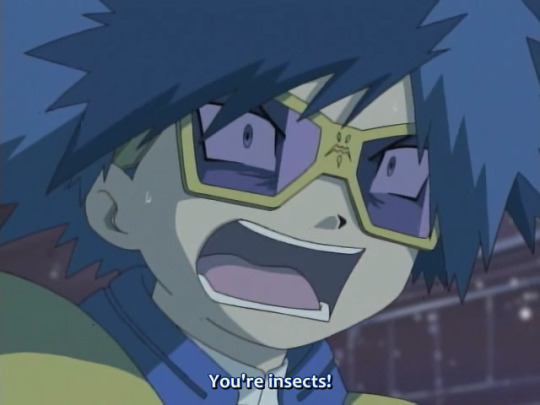
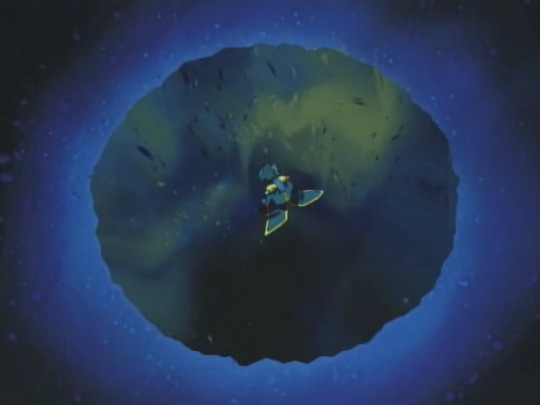
Because everything Ken does as the Kaiser is “unfocused lashing out at everyone”, the Kaiser has less control over his emotions than Ken normally would. Takeru manages to emotionally pin him to a corner by confronting him with enough assertion in 02 episode 19 (this is before he punches him), and correctly points out that the Kaiser isn’t capable of winning with words (i.e. ideologically) and resorts to violence as the first thing he can think of. You’d think that if the Kaiser were actually someone with the self-confidence to consider the other Chosen Children beneath him, he wouldn’t even bother giving them the time of day, but Takeru just happening to be a little assertive is enough to make him lose his composure and start falling apart, and a lot of his shaken “insects!” yelling comes from him seeming pretty desperate to cling onto that rather than being all that confident about his natural superiority over anyone. 02 episode 20 establishes that he’s getting himself in over his head by tampering with the powers of darkness he can’t control, and while, on a plot level, it means that he’s misjudged his own capabilities, on a metaphorical level, it corresponds to the fact that even Ken himself is incapable of getting himself out of the emotional abyss he’s in.
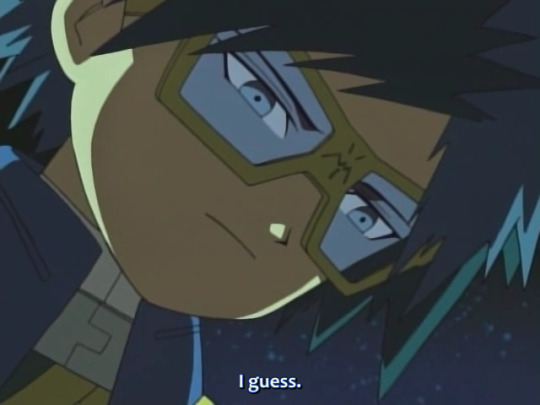
And on the flip side, one of the biggest “tells” that Ken is still miserable during all of this is 02 episode 9, where he’s seen ruminating on the “glory” he’s getting in the real world despite having just decided to leave it all behind. The episode prior, after all, had been called “The Digimon Kaiser’s Loneliness”. The media is using him like some kind of “hot topic”, his parents’ affection (in his mind) is shallow and based only on his achievements, and he has no friends (how much of a role Akiyama Ryou played in his childhood is unclear, but either way, he’s no longer around now). With no emotional support coming from any direction in the real world, he’s resorting to at least trying to have some “fun” in what he perceives to be a “game”, and yet he’s still not having fun at all.
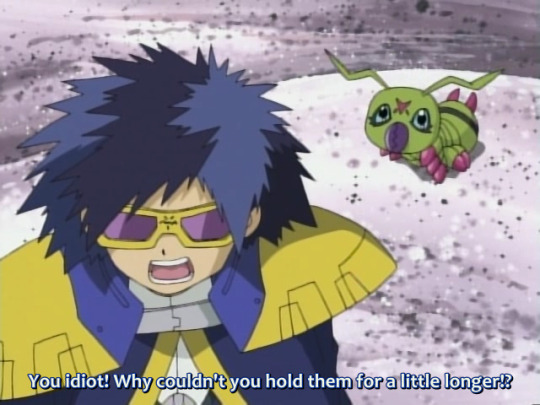
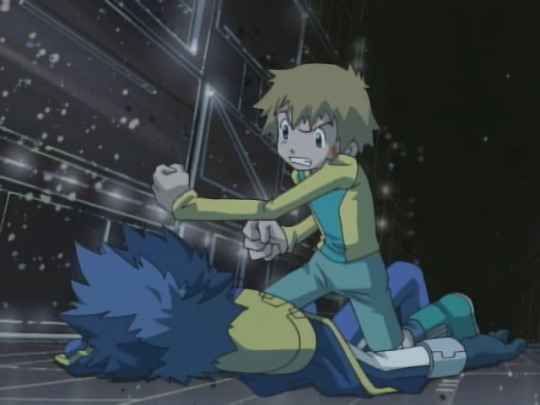
If you look carefully at a lot of the Kaiser’s actions during the first half of the series, one thing you’ll notice is that there are multiple indications that he’s not quite up to par to being as sadistic as you’d think he’d be. Recalling that we learn in 02 episodes 20-21 that the Kaiser is under the impression that the Digital World is like a game that he can “reset” and the Digimon in it not real living beings, it has interesting implications of the fact that he’s actually very hesitant to physically harm other human beings -- he certainly likes emotionally toying with them, but even when he’s trying to take petty revenge on Daisuke in 02 episode 8, he goes out of his way to set up a trap with Bakemon to torture him rather than, well, actually using the kids as hostages. That’s a hell of a lot of work to do, but he instead uses this extremely roundabout way to get them out of the picture in a somewhat less harmful way, risking having them escape (which is exactly what happens).
And in 02 episode 19, when Takeru confronts him and he ends up whipping him, you can hear a slight “...gh?” in the Japanese audio for a split second right after that, meaning that the Kaiser is, for some reason, having a hard time dealing with the fact that he just hit Takeru, and he does a very poor job defending himself against Takeru punching him out despite ostensibly being trained in judo. (Seriously, if you watch the animation of the scene, he’s just lying there while Takeru repeatedly punches the hell out of him, because he’s so out of it.) Regarding the Digimon, he’s convinced himself that they’re not living beings, but regarding the human Chosen Children, who undeniably are, no matter how much he might look down on them, he has a suspiciously hard time harming them as much as he could...
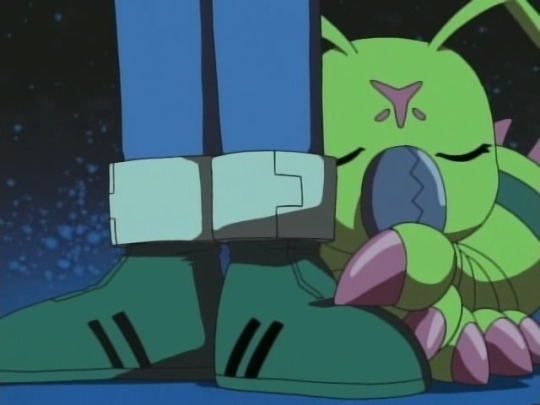
On top of that, one interesting question that might come up to one rewatching the first half of 02 is the strange “contradiction” of why the Kaiser ostensibly seems to hate Wormmon so much, calling him an unworthy idea of a partner in 02 episodes 10 and 19, and yet does remarkably little to get Wormmon away from him or off his case (he hates Wormmon calling him “Ken-chan”, yet doesn’t really try very hard to stop him). He could have easily locked Wormmon away in a cage or something if he really wanted to -- actually, there’s the question, why doesn’t he slap an Evil Ring on him? Because in the end, Wormmon is the only emotional support he’s really getting, and so it’s likely he unconsciously doesn’t want to lose that. Recalling that Digimon are fundamentally linked to the inner self, the Kaiser rejecting Wormmon for being “weak” is analogous to Ken rejecting his own self for being “weak” and “not perfect” -- which means that the fact he still keeps Wormmon around is analogous to the fact that Ken hasn’t really been able to bring himself to completely let his fundamental nature go. And, hence, it’s why he gets so initially incensed at Wormmon’s “betrayal” at 02 episode 10 (and yet still keeps him around despite that), and is ultimately emotionally destroyed by his death in 02 episode 21.
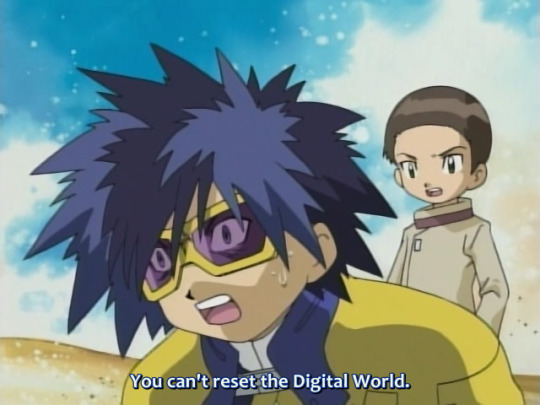
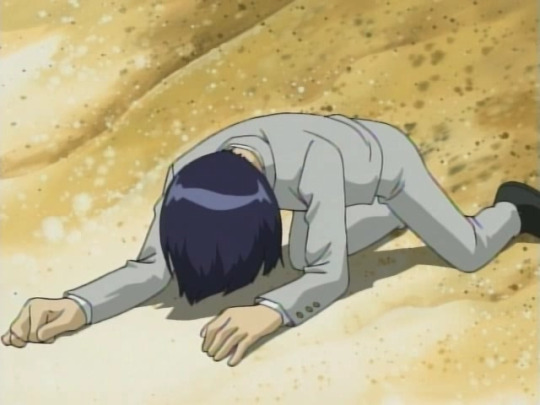
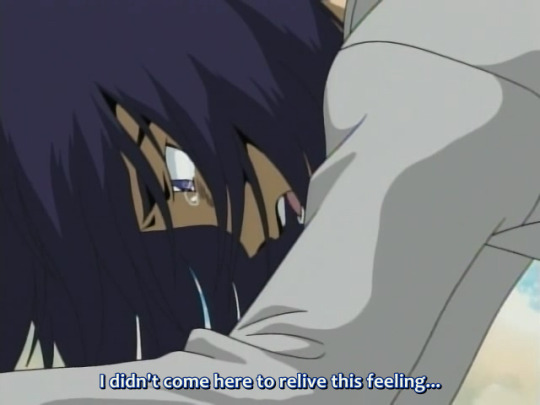
Although, actually, if you look carefully at 02 episode 21, it’s not quite Wormmon’s death that necessarily does it -- the turning point where he sheds the Kaiser persona is right before that (and in case you have any doubts, the animation puts highlights in his eyes for the first time in the series right at that point). Wormmon’s death is the first major consequence of his actions that he has to deal with, but what actually brought Ken back to his senses was his own realization that Digimon are living beings, that his actions have had permanent effects this whole time, and that he can’t take back anything he’d done.
Remember that 02 is a series that is largely about moving on and accepting that you can’t change the past, and that you have to move forward regardless of that. Ken’s fall into sadism was only possible by driving him into extremely deep-seated denial -- he was already starting to face the potential reality of Digimon being real, existing beings in the real world an episode prior. He says, outright, in 02 episode 21, that part of the reason he came to the Digital World to do all of this was escapism -- and, presumably, under the idea that any mistake he made could be rolled back and redone, unlike Osamu’s death. But the Digital World is not a place you can reset like a game, Ken will have to live with the consequences of his actions again, and moreover, every single one of the actions he’d been convincing himself were relatively meaningless had caused severe and permanent harm, and the entire thing overwhelms him.
It’s also important to point out that this was probably where the Dark Seed had to work a lot of magic to get Ken to embrace this kind of denial so easily -- after all, it’s established in the final quarter of the series that it does have a tangible impact on personality and puts a damper on one’s ability to feel empathy. In the flashback in 02 episode 23, regardless of whether Ken considered the Digital World to be a “game” or “able to be reversed” or not, he clearly still didn’t care and treated those around him with proper kindness (even if he did consider it to be all of that, it probably wouldn’t have been entirely unlike how a lot of us have a hard time picking rude choices in video games). It’s a very complicated chain reaction of events that allowed this to be even possible, and it was so against his fundamental nature that once the denial broke and Ken reached his limit, he wasn’t able to do it anymore. The Chosen Children’s main role in 02 episode 21 was really just cleaning up the massive mess he’d made in the form of Chimeramon, but as far as the whole thing about the Kaiser’s persona completely falling apart and Ken being forced to confront his own self goes, that was pretty much all Ken and Wormmon, in a series of dominoes that had already been collapsing for episodes on end.
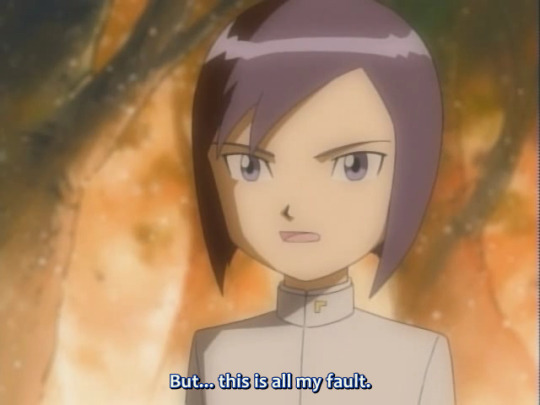
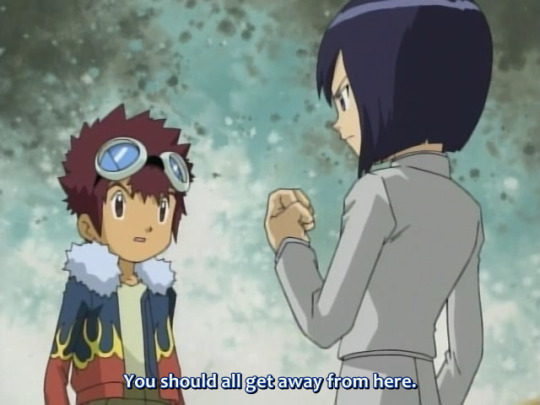
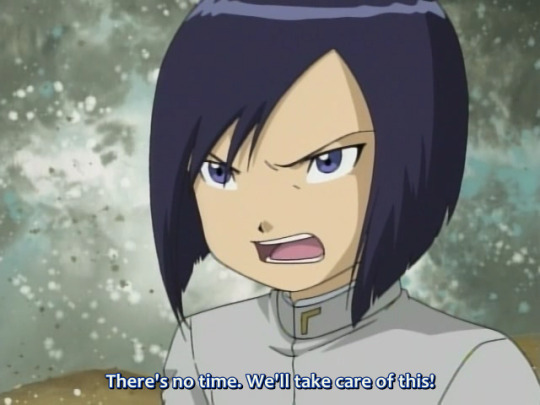
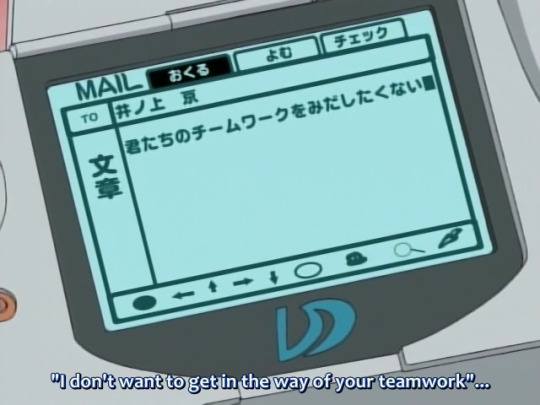
The following episodes have Ken treat the 02 team with a certain amount of detachment, and this is often construed by a handful of people as being reflective of Ken being standoffish of some sort. The fact that Daisuke and Ken are often promoted in franchise materials as “rivals” mainly due to them being in the “protagonist and right-hand-man” position such characters are in might tempt you to think that way, but they are most definitely not!! (Considering that even saying that Taichi and Yamato fit that mold is a bit questionable, and neither Ruki nor Jian quite fulfill the expectations of the role in regards to the genre-subverting Tamers, Frontier, which is explicitly said to be deliberately written to be conventional, is probably the first proper execution of this trope in the form of Takuya and Kouji.) Ken’s detachment from the group at this time in the series is something he actually gives the reason for quite directly: he believes it’s his fault and doesn’t want to burden them with what he considers to be his job, and in the end Daisuke ultimately breaks through to him and they become completely normal friends who get along. “Rival” what?
Ken is, at worst, distant during this point of the series, but he’s actually very straightforward about what he wants and intends to do; it’s just that he’s being a bit blunt about it because he’s still drowning in his shame and not sure how to approach them. (Also, consider the fact he was rather lacking in friends or a support group before all of this; he doesn’t have a lot of experience in socializing, either.) So he keeps everyone at arm’s length, and the reason he comes off as so standoffish is because he’s so assertive! He directly and bluntly makes some very strong remarks about how he believes everyone else shouldn’t be getting involved! Again, when left to his own devices and not being manipulated into by a supernatural evil seed into multiple levels of denial, Ken is very in control of what he wants and thinks, and is even very open about speaking his mind.
That’s even when they’re not good decisions, mind you. Ken starts off the climax of 02 episode 26 being very firm about wanting to suicidally throw himself into the reactor in order to stop it, and 02 episode 30 has him consider himself a burden to the team after the fallout with Iori and try to stay out of it despite them very badly needing his presence, which Daisuke (of all people!) rightfully calls him out for being childish about. But he also listens to reason very quickly and acknowledges the others’ point very easily, with Daisuke reminding him in 02 episode 26 that his suicidal recklessness is actually pretty self-centered and short-sighted of him, since it’ll prevent him from doing anything else to take responsibility for his actions going forward, and Miyako, uh, slapping him in 02 episode 30. (But he comes quietly right away as if acknowledging his own idiocy, and never holds it against her thereafter.)
Nevertheless, the point is: you can see that this kind of assertiveness is the same kind of assertiveness he had as the Kaiser, just channeled in a different direction and for a different purpose. But as the Kaiser, he was angrily lashing out at anything and everything and stepping on anything he could just so he could have a show of power; once he comes back to his senses, he reserves that force for it being something he consciously believes is the right thing to do (regardless of whether it’s actually the right thing to do or not).
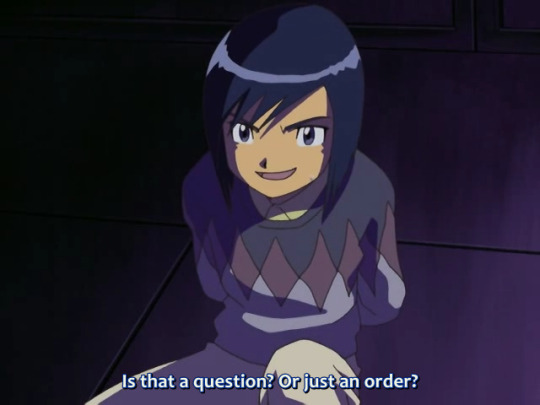
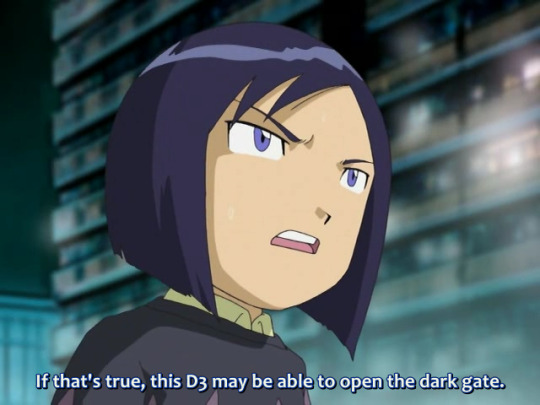
Because of the fact Ken spends a lot of the last quarter of 02 suffering and parsing a lot of trauma, a lot of people have tended to pin him as constantly sad and being a soft crybaby, but that couldn’t be further from the truth! Despite all the emotional pain he goes through, Ken has a hell of a ton of strength through all of this -- he even flings a well-aimed quip at Oikawa in 02 episode 44 despite being in a completely helpless situation, and in 02 episode 45 he himself is the one who volunteers to open the gate to the Dark Ocean, despite knowing exactly what it entails. That takes a lot of guts, and all things considered, his recovery from being the Kaiser spans only four months and is altogether incredibly fast given what he went through -- it did not take long for him to regain his bearings and get himself back on track. Again, it’s the same kind of “assertiveness” and capacity for action that fuels what the Kaiser did, just better controlled and in a direction Ken knows he actually wants.
This is also why I tend to object to insinuations that Ken would be overly touchy about or traumatized by the mere discussion of him being the Kaiser in the aftermath of 02, because the series itself, multiple times, portrayed him as being very able to talk about his experiences bluntly and honestly, at worst maybe considering it a bit of an awkward topic. He has no problems admitting that it was a thing that happened, especially if it involves discussing it as part of taking responsibility or preventing further damage -- it’s just that he of course doesn’t enjoy it either, and is equally as open about the shame he feels as a result. All of the times Ken loses his composure in the latter half of 02 involve either physical pain being inflicted on him, or a lot more actively vicious invocation of his memories and insecurities, and even then he gets himself back on his feet with a rather prompt amount of speed. Poorly timed of a statement as it may have been, Miyako is not incorrect when she says in 02 episode 31 that he has a certain amount of natural resilience that he carried from being the Kaiser.
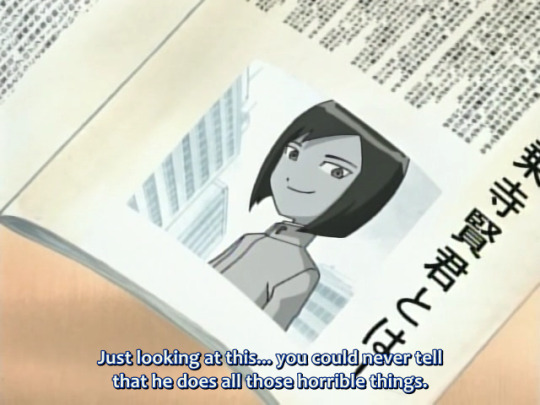
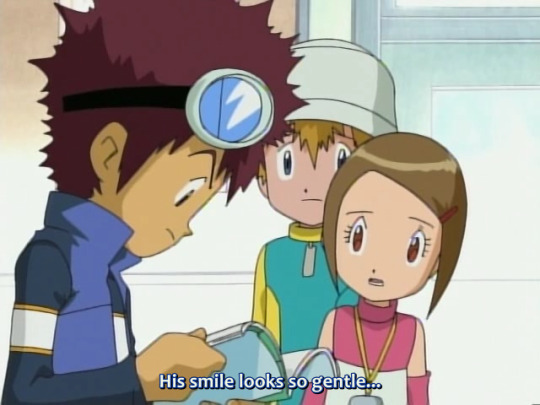
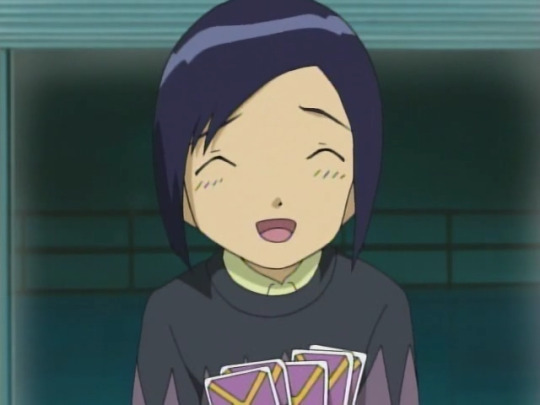
All the way back in 02 episode 9, shortly after it was revealed to the group that Ken was the Kaiser, Iori, Hikari, and Takeru all label Ken as someone who doesn’t look like someone who could do something so horrible, and Hikari even says that his smile looks “gentle” (note that this is yasashisou, a word derived from the same root word used for his Crest). So in other words, even all three of them were able to catch on to his actual nature betraying himself even during that awful period of time. It’s still poking through, all things considered.
But we as the audience know he’s putting on that face for the camera, and his eyes are still as dead-eyed as they are for the first half of the series, and when Miyako accidentally makes him laugh during the Christmas party in 02 episode 38, it’s very much framed as probably the first time Ken has been this genuinely happy in a long while. He was never able to be this happy even when “satisfying” himself by stepping on others as the Kaiser.
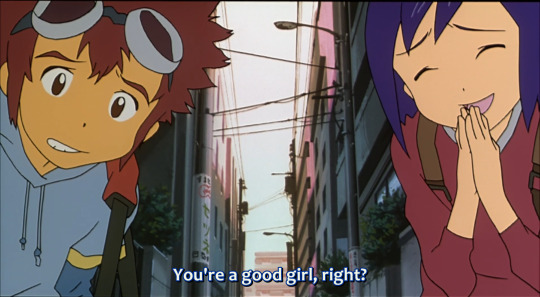

And that’s why it’s so extremely unlikely that Ken will ever be able to lapse back into the Kaiser persona after the events of 02, even with the Dark Seed technically still inside his neck. He wasn’t enjoying it anyway; the Kaiser persona wasn’t a habit that he fell into out of emotional suppression or even catharsis, but rather him forcing himself into a role he was never comfortable in to begin with. He was never truly satisfied with anything he was getting out of it, and moreover, it took the combination of supernatural influence and a hell of a lot of denial to allow it to get that far in the first place, because of how far against his fundamental nature that was. (Again, for those of you who have seen Appmon: think about what it would take to get Haru to embrace sadism.) Even Osamu wasn’t enjoying being cold; being kind and living your life with positivity is a lot more fulfilling and fun, anyway.
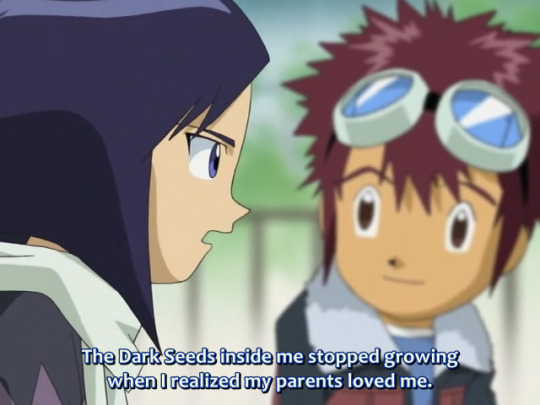
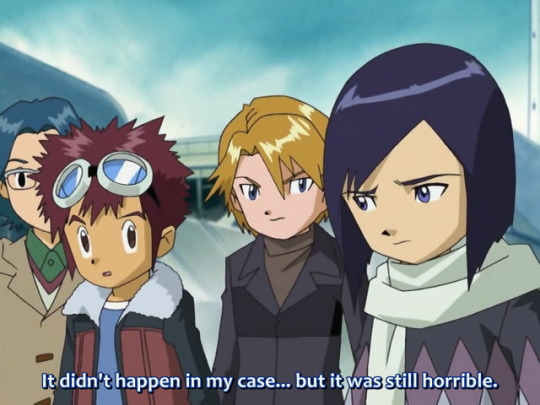

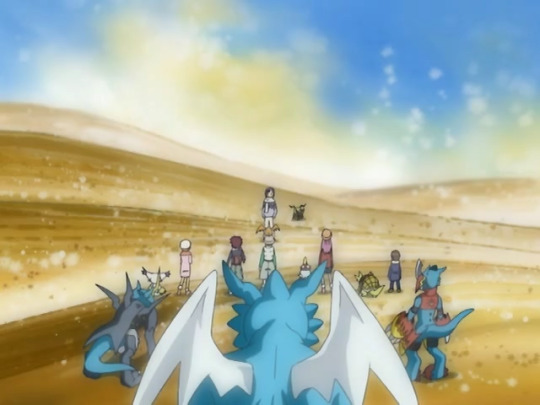
In 02 episode 48, Ken describes the influence of the Seed as “horrible” in retrospect; even if it didn’t involve physical pain and exhaustion the way it did for the Dark Seed children, the entire experience sucked even back then. And while Ken theorizes about the Dark Seed’s influence being countered by the power of love earlier in the episode, when you look at the whole of 02, it’s not just his family’s love -- Ken now has the emotional support of his family, and Wormmon, and his newfound friends, and that’s giving him all of the fulfillment he wanted that putting on a front of sadism wasn’t giving him, and he doesn’t really need anything else anymore.
02 itself is very much about the fact that it’s not a bad thing to rely on the support of others to be happy; the Ken and Kaiser are undoubtedly the same person, but the latter’s existence requires a very specific lineup of events and factors to happen, and one of the massive parts behind that was a severe lack of emotional support or anyone who properly understood him. And by the end of the series, Ken has more than enough strength of heart to accept everything that’s happened and move on, and to stop reaching out to denial and clinging onto the past, and he has emotional support and understanding from a whole new group of friends that thoroughly understand everything he did and went through, and wholeheartedly accept and love him anyway.
He is never going to have a gaping hole in his life like that again.
167 notes
·
View notes
Text
When it was announced that The Rosie O'Donnell Show would be back for one night only with a guest list of about 15 million Broadway talents, many of us wondered, would it be a return to the glory days of her multiple Emmy-winning daytime talk show or more like her ill-fated attempt to resuscitate the primetime variety format on NBC in 2008. It turned out to borrow from both those predecessors while evolving into something completely different — a low-tech lovefest that felt like eavesdropping on a group chat among friends looking out for one another in a time of need.
It was spontaneous, messy and blighted by some of the worst audio glitches imaginable. Yet it was often affectingly intimate, and even over an endurance-testing three-and-a-half commercial-free hours, also strangely addictive. The lack of slickness seemed to carry through to the relaxed manner of the guests, and their refreshing unpretentiousness.
Conceived by actor-producer (and occasional tech-support helpmate) Erich Bergen and live-streamed on Broadway.com and the website's YouTube channel, the show was a benefit for The Actors Fund, the charitable organization founded in 1882 that supports performers and behind-the-scenes theater workers. It raised more than half-a-million dollars, O'Donnell announced at the end of the marathon, sitting in a Hamilton hoodie and offering a champagne toast in a glass emblazoned with the face of Barbra Streisand.
She conducted the entire show from behind a laptop in her New Jersey garage, its floor spattered with the paint spillage of countless craft projects. "I'm a little bit of a Broadway nerd, I admit it," said O'Donnell, establishing her dual role as host and superfan.
Part of the show's unique pleasure was seeing favorite Broadway performers chilling in their own homes, almost all of them dressed down, with little visible attention to makeup or hair, and zero concern about unflattering angles. It was a great equalizer, proving that even artists who can hold packed theaters in the palm of their hands with a song are housebound and trying to make the best of a bad situation just like the rest of us — staying close to their families, killing time, learning to cook, wondering how long this unnerving isolation will last. Or how much longer we can put off that shower.
It was kind of comforting to see Idina Menzel sitting by her microwave and confessing, "I guess I'm going a little bonkers," while lamenting a failed lasagna attempt and sharing the challenges of homeschooling her son when she's no math genius. Likewise, hearing Matthew Broderick and Sarah Jessica Parker talk about watching Columbo reruns or catching up on The Crown, while SJP begged for no spoilers on the final episode of The Sopranos, which she may now get to at last. Seeing Annette Bening on her Los Angeles balcony wearing a "Make America Kind Again" baseball cap was as much a tonic as watching Neil Patrick Harris do a card trick with his adorable twins. And who doesn't want to meet Gloria and Emilio Estefan's cute rescue dogs or hear about Lin-Manuel Miranda's kids' reaction to their first exposure to Singin' in the Rain?
Then there were the musical interludes.
Where else could you catch Patti LuPone, in magnificent voice, singing the urgently upbeat 1930s standard "A Hundred Years From Today," unaccompanied while sitting by the jukebox in her basement? Or Kelli O'Hara nestled into an armchair honoring Stephen Sondheim's 90th birthday by wrapping her crystalline soprano around "Take Me to the World," a hymn to unity from Evening Primrose? Or husband and wife Audra McDonald and Will Swenson duetting on the Charlie Chaplin evergreen, "Smile," from their Westchester living room? Or Darren Criss pouring his heart into another Sondheim classic about the desire for connection, "Being Alive," from Company, accompanying himself in a lovely pop arrangement on acoustic guitar from the sofa of his Los Angeles home? And while sound problems plagued Barry Manilow's selection of hits, ending with "I Made It Through the Rain," I was tickled to see his Judy Garland Kleenex dispenser.
Many of the song choices were thoughtfully apropos of the current crisis, offering comforting reassurance of the eventual return of resilience and togetherness while people in major cities all over the country self-isolate as the infection rate of the coronavirus pandemic continues to climb. Maybe Tituss Burgess at his home keyboard singing "The Glory of Love" is exactly the kind of uplift we all need right now.
Even in the seemingly random numbers, the entire enterprise was characterized by a spirit of generosity and sharing.
Kristin Chenoweth celebrated a Starbucks romance in "Taylor the Latte Boy." Matthew Morrison goofed it up on ukulele to a mashup of "The Bare Necessities" and "Zip-a-Dee-Doo-Dah" from his Disney Dreamin' album. Alan Menken whipped through a medley of his songs from The Little Mermaid, Beauty and the Beast and Little Shop of Horrors, among others, at the piano. Ben Platt, also at the keyboard, did Bob Dylan's "Make You Feel My Love." And Adrienne Warren, the sensational star of Tina: The Tina Turner Musical, growled out "Simply the Best" from her bathtub. That was on the third attempt during a particularly troublesome audio patch, by which time her bubbles were history.
Prompted by O'Donnell, more than one guest reminded viewers that The Actors Fund is not just about Broadway artists pulling star salaries but also stagehands, makeup artists, wigmakers and ushers who work in what is very much a gig economy. The organization provides emergency financial assistance, social services, affordable housing, healthcare and insurance counseling and addiction support.
"Everything's a one-off," said Tony-winning actor Brian Stokes Mitchell, who serves as chairman of The Actors Fund. "That's how we get by, and many people are living on the edge right now."
"We're all just one, two, maybe three paychecks away from bankruptcy," added Billy Porter, whose mother is in an Actors Fund nursing home. "In this community, our whole job description is insecurity," said Judith Light.
Porter, along with Lea Salonga and longtime activist Light recalled how Broadway was on the frontlines of another life-threatening struggle during the early days of the AIDS crisis. All of them urged viewers to stay strong and take the time to reflect on the value of solidarity.
While O'Donnell has never been shy about her opposition to Donald Trump and everything he stands for, the show was remarkably light on politics, with just the occasional dig slipping through. She opened with a little celebratory "Yay!" while admitting she had missed the president's daily coronavirus press update, and then explained that she and her guests were not there to talk Trump. When Harvey Fierstein, O'Donnell's 2005 stage husband in Fiddler on the Roof, reminded her of all the election work still to be done, she said, "Let's all just know, we deserve a leader who tells the truth." And the delays in making coronavirus testing more widely available prompted a comment that the government should have gotten busy on that back in January when the writing was already on the wall.
Mostly, however, the hastily revamped Rosie O'Donnell Show was about bringing people together at this time of anxiety and isolation, as the host reconnected with artists whom she has championed since her reign as the Queen of Nice. "Everyone in the community loves you," she told Chita Rivera in a particularly effusive greeting. "You are our queen mother!"
Many of the performers would have been decompressing after rehearsals or Sunday matinees if the Broadway shutdown hadn't happened — Criss in American Buffalo, Broderick and Parker in Plaza Suite, Warren in Tina, Lauren Patten and Elizabeth Stanley in Jagged Little Pill. Sunday would have been LuPone's opening night in the gender-flipped revival of Company. Gavin Creel, who abruptly ended his London run in Waitress to fly home and is in isolation in a cabin in upstate New York, revealed the fear that he might have contracted the virus, given that several others in the cast have fallen ill, with one of them testing positive.
The show bridged the gap separating us from artists whose work we normally experience on the other side of the footlights. Most of us will never again get to see Stephen Sondheim and Andrew Lloyd Webber exchange greetings in song on the birthday the two composers happen to share. From those celebrated veterans to rising-star newbies, the common denominator here was everybody facing the crisis just like us, reaching out a hand of friendship, albeit from a mandatory safe distance.
#darren criss#rosie o’donnell#rosie o'donnell show livestream#the hollywood reporter#press#march 2020
41 notes
·
View notes
Photo

The Book of Tea (茶の本 Cha no Hon) by Okakura Kakuzō (1906) is a long essay linking the role of chadō (teaism) to the aesthetic and cultural aspects of Japanese life.
Tea is a work of art and needs a master hand to bring out its noblest qualities.
We have good and bad tea, as we have good and bad paintings--generally the latter. There is no single recipe for making the perfect tea, as there are no rules for producing a Titian or a Sesson. Each preparation of the leaves has its individuality, its special affinity with water and heat, its own method of telling a story. The truly beautiful must always be in it. How much do we not suffer through the constant failure of society to recognise this simple and fundamental law of art and life; Lichilai, a Sung poet, has sadly remarked that there were three most deplorable things in the world: the spoiling of fine youths through false education, the degradation of fine art through vulgar admiration, and the utter waste of fine tea through incompetent manipulation.
Like Art, Tea has its periods and its schools. Its evolution may be roughly divided into three main stages: the Boiled Tea, the Whipped Tea, and the Steeped Tea. We moderns belong to the last school. These several methods of appreciating the beverage are indicative of the spirit of the age in which they prevailed. For life is an expression, our unconscious actions the constant betrayal of our innermost thought. Confucius said that "man hideth not." Perhaps we reveal ourselves too much in small things because we have so little of the great to conceal. The tiny incidents of daily routine are as much a commentary of racial ideals as the highest flight of philosophy or poetry. Even as the difference in favorite vintage marks the separate idiosyncrasies of different periods and nationalities of Europe, so the Tea-ideals characterise the various moods of Oriental culture. The Cake-tea which was boiled, the Powdered-tea which was whipped, the Leaf-tea which was steeped, mark the distinct emotional impulses of the Tang, the Sung, and the Ming dynasties of China. If we were inclined to borrow the much-abused terminology of art-classification, we might designate them respectively, the Classic, the Romantic, and the Naturalistic schools of Tea.
The tea-plant, a native of southern China, was known from very early times to Chinese botany and medicine. It is alluded to in the classics under the various names of Tou, Tseh, Chung, Kha, and Ming, and was highly prized for possessing the virtues of relieving fatigue, delighting the soul, strengthening the will, and repairing the eyesight. It was not only administered as an internal dose, but often applied externally in form of paste to alleviate rheumatic pains. The Taoists claimed it as an important ingredient of the elixir of immortality. The Buddhists used it extensively to prevent drowsiness during their long hours of meditation.
By the fourth and fifth centuries Tea became a favourite beverage among the inhabitants of the Yangtse-Kiang valley. It was about this time that modern ideograph Cha was coined, evidently a corruption of the classic Tou. The poets of the southern dynasties have left some fragments of their fervent adoration of the "froth of the liquid jade." Then emperors used to bestow some rare preparation of the leaves on their high ministers as a reward for eminent services. Yet the method of drinking tea at this stage was primitive in the extreme. The leaves were steamed, crushed in a mortar, made into a cake, and boiled together with rice, ginger, salt, orange peel, spices, milk, and sometimes with onions! The custom obtains at the present day among the Thibetans and various Mongolian tribes, who make a curious syrup of these ingredients. The use of lemon slices by the Russians, who learned to take tea from the Chinese caravansaries, points to the survival of the ancient method.
It needed the genius of the Tang dynasty to emancipate Tea from its crude state and lead to its final idealization. With Luwuh in the middle of the eighth century we have our first apostle of tea. He was born in an age when Buddhism, Taoism, and Confucianism were seeking mutual synthesis. The pantheistic symbolism of the time was urging one to mirror the Universal in the Particular. Luwuh, a poet, saw in the Tea-service the same harmony and order which reigned through all things. In his celebrated work, the "Chaking" (The Holy Scripture of Tea) he formulated the Code of Tea. He has since been worshipped as the tutelary god of the Chinese tea merchants.
The "Chaking" consists of three volumes and ten chapters. In the first chapter Luwuh treats of the nature of the tea-plant, in the second of the implements for gathering the leaves, in the third of the selection of the leaves. According to him the best quality of the leaves must have "creases like the leathern boot of Tartar horsemen, curl like the dewlap of a mighty bullock, unfold like a mist rising out of a ravine, gleam like a lake touched by a zephyr, and be wet and soft like fine earth newly swept by rain."
The fourth chapter is devoted to the enumeration and description of the twenty-four members of the tea-equipage, beginning with the tripod brazier and ending with the bamboo cabinet for containing all these utensils. Here we notice Luwuh's predilection for Taoist symbolism. Also it is interesting to observe in this connection the influence of tea on Chinese ceramics. The Celestial porcelain, as is well known, had its origin in an attempt to reproduce the exquisite shade of jade, resulting, in the Tang dynasty, in the blue glaze of the south, and the white glaze of the north. Luwuh considered the blue as the ideal colour for the tea-cup, as it lent additional greenness to the beverage, whereas the white made it look pinkish and distasteful. It was because he used cake-tea. Later on, when the tea masters of Sung took to the powdered tea, they preferred heavy bowls of blue-black and dark brown. The Mings, with their steeped tea, rejoiced in light ware of white porcelain.
In the fifth chapter Luwuh describes the method of making tea. He eliminates all ingredients except salt. He dwells also on the much-discussed question of the choice of water and the degree of boiling it. According to him, the mountain spring is the best, the river water and the spring water come next in the order of excellence. There are three stages of boiling: the first boil is when the little bubbles like the eye of fishes swim on the surface; the second boil is when the bubbles are like crystal beads rolling in a fountain; the third boil is when the billows surge wildly in the kettle. The Cake-tea is roasted before the fire until it becomes soft like a baby's arm and is shredded into powder between pieces of fine paper. Salt is put in the first boil, the tea in the second. At the third boil, a dipperful of cold water is poured into the kettle to settle the tea and revive the "youth of the water." Then the beverage was poured into cups and drunk. O nectar! The filmy leaflet hung like scaly clouds in a serene sky or floated like waterlilies on emerald streams. It was of such a beverage that Lotung, a Tang poet, wrote: "The first cup moistens my lips and throat, the second cup breaks my loneliness, the third cup searches my barren entrail but to find therein some five thousand volumes of odd ideographs. The fourth cup raises a slight perspiration,--all the wrong of life passes away through my pores. At the fifth cup I am purified; the sixth cup calls me to the realms of the immortals. The seventh cup--ah, but I could take no more! I only feel the breath of cool wind that rises in my sleeves. Where is Horaisan? Let me ride on this sweet breeze and waft away thither."
The remaining chapters of the "Chaking" treat of the vulgarity of the ordinary methods of tea-drinking, a historical summary of illustrious tea-drinkers, the famous tea plantations of China, the possible variations of the tea-service and illustrations of the tea-utensils. The last is unfortunately lost.
The appearance of the "Chaking" must have created considerable sensation at the time. Luwuh was befriended by the Emperor Taisung (763-779), and his fame attracted many followers. Some exquisites were said to have been able to detect the tea made by Luwuh from that of his disciples. One mandarin has his name immortalised by his failure to appreciate the tea of this great master.
In the Sung dynasty the whipped tea came into fashion and created the second school of Tea. The leaves were ground to fine powder in a small stone mill, and the preparation was whipped in hot water by a delicate whisk made of split bamboo. The new process led to some change in the tea-equippage of Luwuh, as well as in the choice of leaves. Salt was discarded forever. The enthusiasm of the Sung people for tea knew no bounds. Epicures vied with each other in discovering new varieties, and regular tournaments were held to decide their superiority. The Emperor Kiasung (1101-1124), who was too great an artist to be a well-behaved monarch, lavished his treasures on the attainment of rare species. He himself wrote a dissertation on the twenty kinds of tea, among which he prizes the "white tea" as of the rarest and finest quality.
The tea-ideal of the Sungs differed from the Tangs even as their notion of life differed. They sought to actualize what their predecessors tried to symbolise. To the Neo-Confucian mind the cosmic law was not reflected in the phenomenal world, but the phenomenal world was the cosmic law itself. Aeons were but moments--Nirvana always within grasp. The Taoist conception that immortality lay in the eternal change permeated all their modes of thought. It was the process, not the deed, which was interesting. It was the completing, not the completion, which was really vital. Man came thus at once face to face with nature. A new meaning grew into the art of life. The tea began to be not a poetical pastime, but one of the methods of self-realisation. Wangyucheng eulogised tea as "flooding his soul like a direct appeal, that its delicate bitterness reminded him of the aftertaste of a good counsel." Sotumpa wrote of the strength of the immaculate purity in tea which defied corruption as a truly virtuous man. Among the Buddhists, the southern Zen sect, which incorporated so much of Taoist doctrines, formulated an elaborate ritual of tea. The monks gathered before the image of Bodhi Dharma and drank tea out of a single bowl with the profound formality of a holy sacrament. It was this Zen ritual which finally developed into the Tea-ceremony of Japan in the fifteenth century.
Unfortunately the sudden outburst of the Mongol tribes in the thirteenth century which resulted in the devastation and conquest of China under the barbaric rule of the Yuen Emperors, destroyed all the fruits of Sung culture. The native dynasty of the Mings which attempted re-nationalisation in the middle of the fifteenth century was harassed by internal troubles, and China again fell under the alien rule of the Manchus in the seventeenth century. Manners and customs changed to leave no vestige of the former times. The powdered tea is entirely forgotten. We find a Ming commentator at loss to recall the shape of the tea whisk mentioned in one of the Sung classics. Tea is now taken by steeping the leaves in hot water in a bowl or cup. The reason why the Western world is innocent of the older method of drinking tea is explained by the fact that Europe knew it only at the close of the Ming dynasty.
To the latter-day Chinese tea is a delicious beverage, but not an ideal. The long woes of his country have robbed him of the zest for the meaning of life. He has become modern, that is to say, old and disenchanted. He has lost that sublime faith in illusions which constitutes the eternal youth and vigour of the poets and ancients. He is an eclectic and politely accepts the traditions of the universe. He toys with Nature, but does not condescend to conquer or worship her. His Leaf-tea is often wonderful with its flower-like aroma, but the romance of the Tang and Sung ceremonials are not to be found in his cup.
Japan, which followed closely on the footsteps of Chinese civilisation, has known the tea in all its three stages. As early as the year 729 we read of the Emperor Shomu giving tea to one hundred monks at his palace in Nara. The leaves were probably imported by our ambassadors to the Tang Court and prepared in the way then in fashion. In 801 the monk Saicho brought back some seeds and planted them in Yeisan. Many tea-gardens are heard of in succeeding centuries, as well as the delight of the aristocracy and priesthood in the beverage. The Sung tea reached us in 1191 with the return of Yeisai-zenji, who went there to study the southern Zen school. The new seeds which he carried home were successfully planted in three places, one of which, the Uji district near Kioto, bears still the name of producing the best tea in the world. The southern Zen spread with marvellous rapidity, and with it the tea-ritual and the tea-ideal of the Sung. By the fifteenth century, under the patronage of the Shogun, Ashikaga-Voshinasa, the tea ceremony is fully constituted and made into an independent and secular performance. Since then Teaism is fully established in Japan. The use of the steeped tea of the later China is comparatively recent among us, being only known since the middle of the seventeenth century. It has replaced the powdered tea in ordinary consumption, though the latter still continues to hold its place as the tea of teas.
It is in the Japanese tea ceremony that we see the culmination of tea-ideals. Our successful resistance of the Mongol invasion in 1281 had enabled us to carry on the Sung movement so disastrously cut off in China itself through the nomadic inroad. Tea with us became more than an idealisation of the form of drinking; it is a religion of the art of life. The beverage grew to be an excuse for the worship of purity and refinement, a sacred function at which the host and guest joined to produce for that occasion the utmost beatitude of the mundane. The tea-room was an oasis in the dreary waste of existence where weary travellers could meet to drink from the common spring of art- appreciation. The ceremony was an improvised drama whose plot was woven about the tea, the flowers, and the paintings. Not a colour to disturb the tone of the room, not a sound to mar the rhythm of things, not a gesture to obtrude on the harmony, not a word to break the unity of the surroundings, all movements to be performed simply and naturally--such were the aims of the tea- ceremony. And strangely enough it was often successful. A subtle philosophy lay behind it all. Teaism was Taoism in disguise.
Daily inspiration. Discover more photos at http://justforbooks.tumblr.com
26 notes
·
View notes